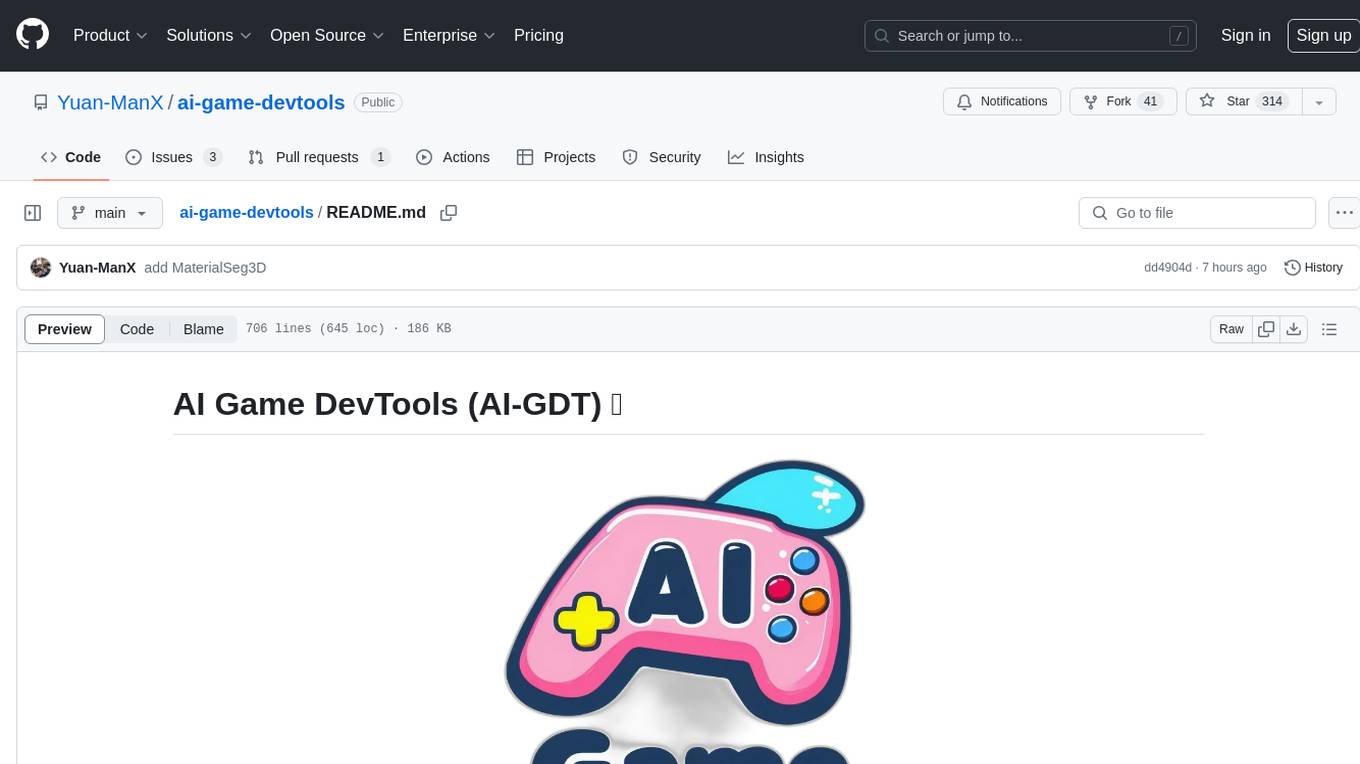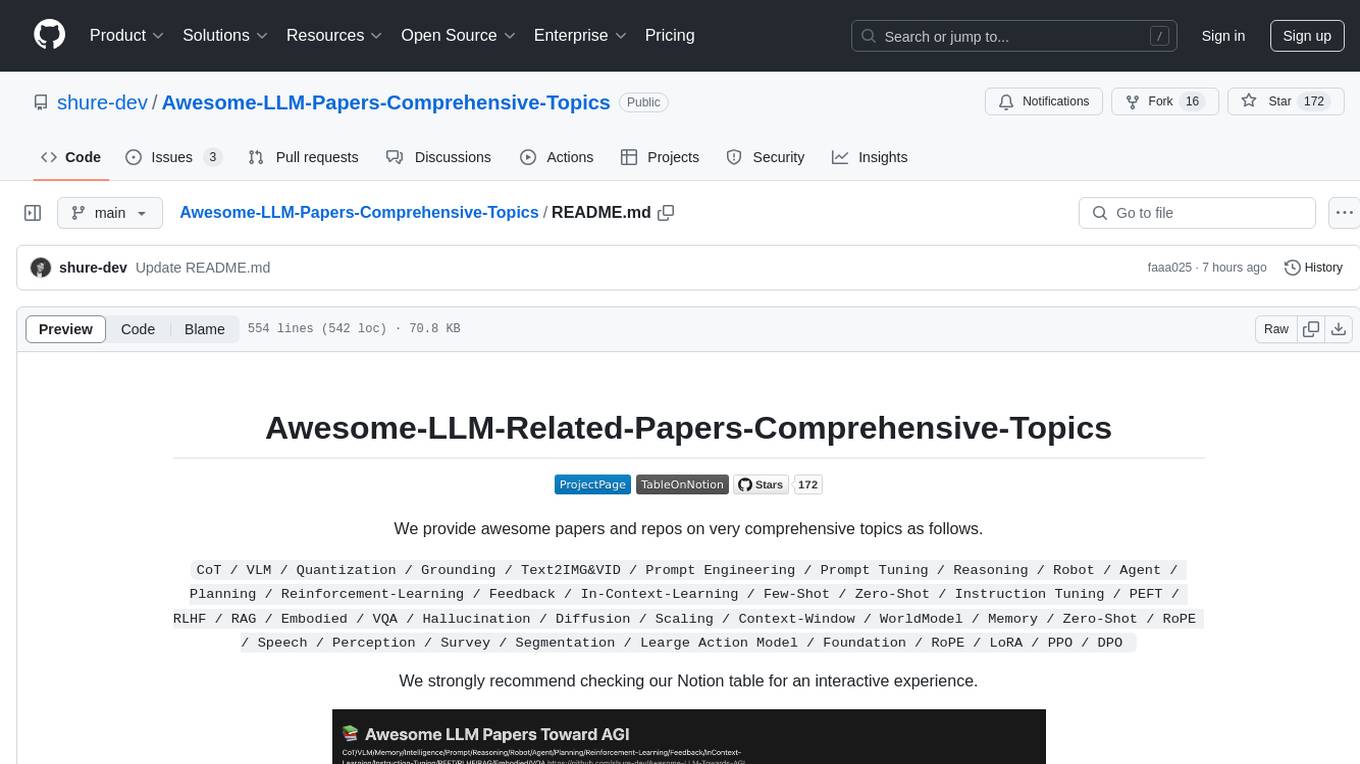
open-llms
📋 A list of open LLMs available for commercial use.
Stars: 10319
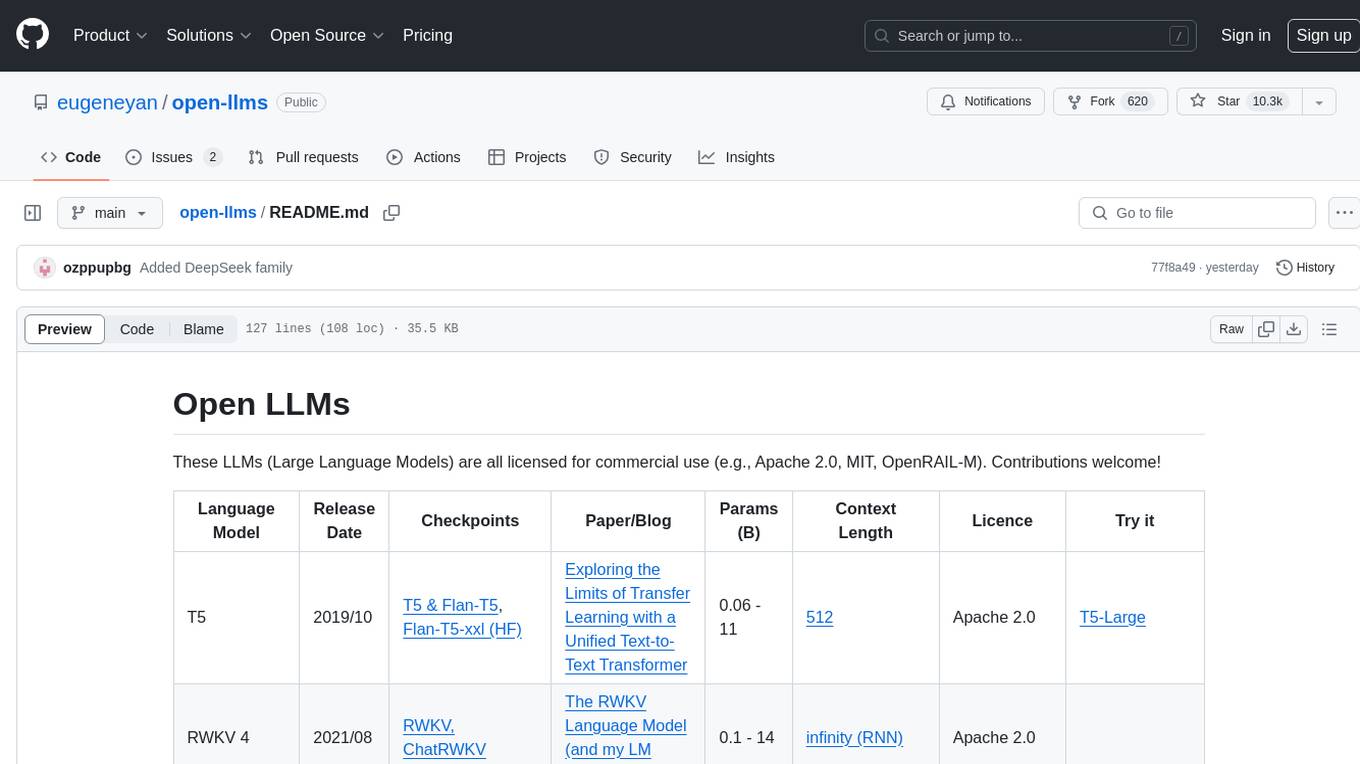
Open LLMs is a repository containing various Large Language Models licensed for commercial use. It includes models like T5, GPT-NeoX, UL2, Bloom, Cerebras-GPT, Pythia, Dolly, and more. These models are designed for tasks such as transfer learning, language understanding, chatbot development, code generation, and more. The repository provides information on release dates, checkpoints, papers/blogs, parameters, context length, and licenses for each model. Contributions to the repository are welcome, and it serves as a resource for exploring the capabilities of different language models.
README:
These LLMs (Large Language Models) are all licensed for commercial use (e.g., Apache 2.0, MIT, OpenRAIL-M). Contributions welcome!
| Name | Release Date | Paper/Blog | Dataset | Tokens (T) | License |
|---|---|---|---|---|---|
| RedPajama | 2023/04 | RedPajama, a project to create leading open-source models, starts by reproducing LLaMA training dataset of over 1.2 trillion tokens | RedPajama-Data | 1.2 | Apache 2.0 |
| starcoderdata | 2023/05 | StarCoder: A State-of-the-Art LLM for Code | starcoderdata | 0.25 | Apache 2.0 |
| Name | Release Date | Paper/Blog | Dataset | Samples (K) | License |
|---|---|---|---|---|---|
| OIG (Open Instruction Generalist) | 2023/03 | THE OIG DATASET | OIG | 44,000 | Apache 2.0 |
| databricks-dolly-15k | 2023/04 | Free Dolly: Introducing the World's First Truly Open Instruction-Tuned LLM | databricks-dolly-15k | 15 | CC BY-SA-3.0 |
| MPT-7B-Instruct | 2023/05 | Introducing MPT-7B: A New Standard for Open-Source, Commercially Usable LLMs | dolly_hhrlhf | 59 | CC BY-SA-3.0 |
| Name | Release Date | Paper/Blog | Dataset | Samples (K) | License |
|---|---|---|---|---|---|
| OpenAssistant Conversations Dataset | 2023/04 | OpenAssistant Conversations - Democratizing Large Language Model Alignment | oasst1 | 161 | Apache 2.0 |
- Leaderboard by lmsys.org
- Evals by MosaicML
- Holistic Evaluation of Language Models (HELM)
- LLM-Leaderboard
- TextSynth Server Benchmarks
- Open LLM Leaderboard by Hugging Face
- Apache 2.0: Allows users to use the software for any purpose, to distribute it, to modify it, and to distribute modified versions of the software under the terms of the license, without concern for royalties.
- MIT: Similar to Apache 2.0 but shorter and simpler. Also, in contrast to Apache 2.0, does not require stating any significant changes to the original code.
- CC BY-SA-4.0: Allows (i) copying and redistributing the material and (ii) remixing, transforming, and building upon the material for any purpose, even commercially. But if you do the latter, you must distribute your contributions under the same license as the original. (Thus, may not be viable for internal teams.)
- OpenRAIL-M v1: Allows royalty-free access and flexible downstream use and sharing of the model and modifications of it, and comes with a set of use restrictions (see Attachment A)
- BSD-3-Clause: This version allows unlimited redistribution for any purpose as long as its copyright notices and the license's disclaimers of warranty are maintained.
Disclaimer: The information provided in this repo does not, and is not intended to, constitute legal advice. Maintainers of this repo are not responsible for the actions of third parties who use the models. Please consult an attorney before using models for commercial purposes.
- [x] Complete entries for context length, and check entries with
? - [ ]
Add number of tokens trained?(see considerations) - [ ] Add (links to) training code?
- [ ] Add (links to) eval benchmarks?
For Tasks:
Click tags to check more tools for each tasksFor Jobs:
Alternative AI tools for open-llms
Similar Open Source Tools

open-llms
Open LLMs is a repository containing various Large Language Models licensed for commercial use. It includes models like T5, GPT-NeoX, UL2, Bloom, Cerebras-GPT, Pythia, Dolly, and more. These models are designed for tasks such as transfer learning, language understanding, chatbot development, code generation, and more. The repository provides information on release dates, checkpoints, papers/blogs, parameters, context length, and licenses for each model. Contributions to the repository are welcome, and it serves as a resource for exploring the capabilities of different language models.
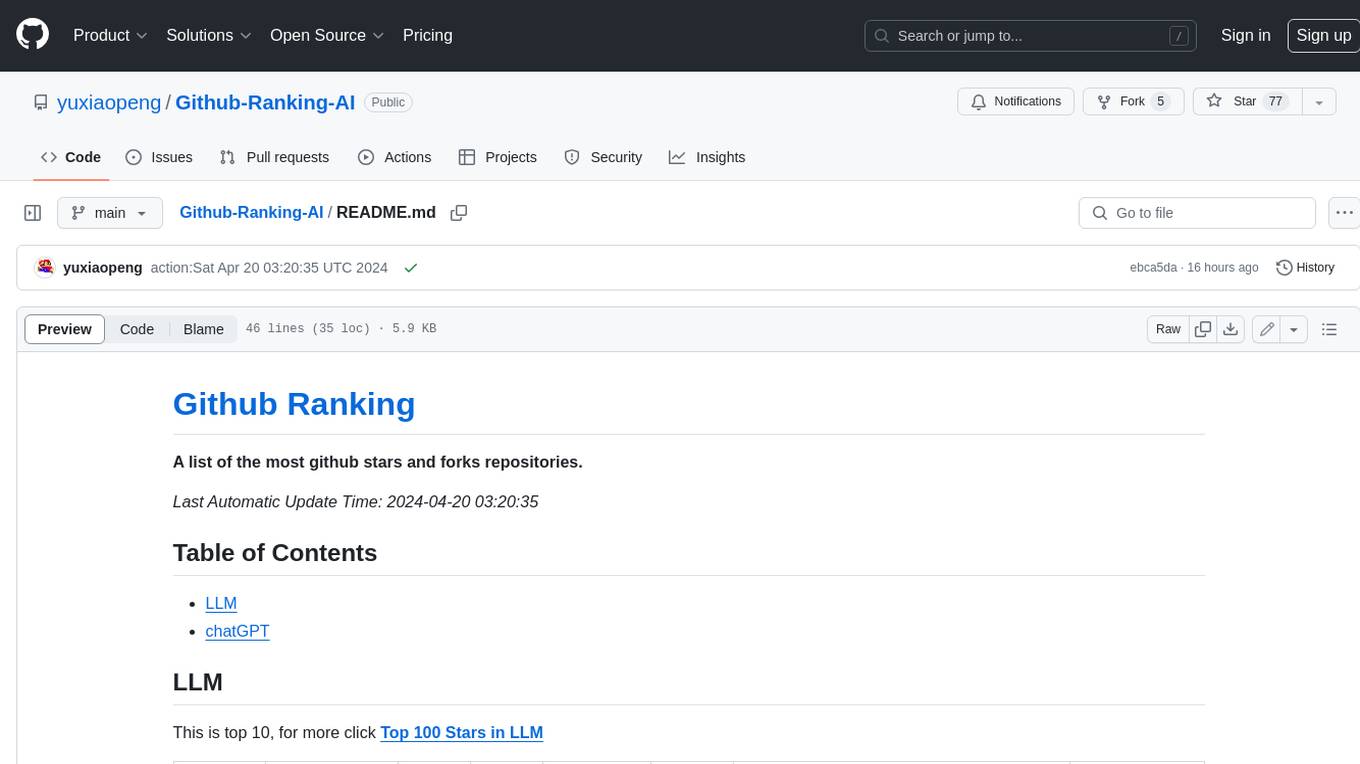
Github-Ranking-AI
This repository provides a list of the most starred and forked repositories on GitHub. It is updated automatically and includes information such as the project name, number of stars, number of forks, language, number of open issues, description, and last commit date. The repository is divided into two sections: LLM and chatGPT. The LLM section includes repositories related to large language models, while the chatGPT section includes repositories related to the chatGPT chatbot.
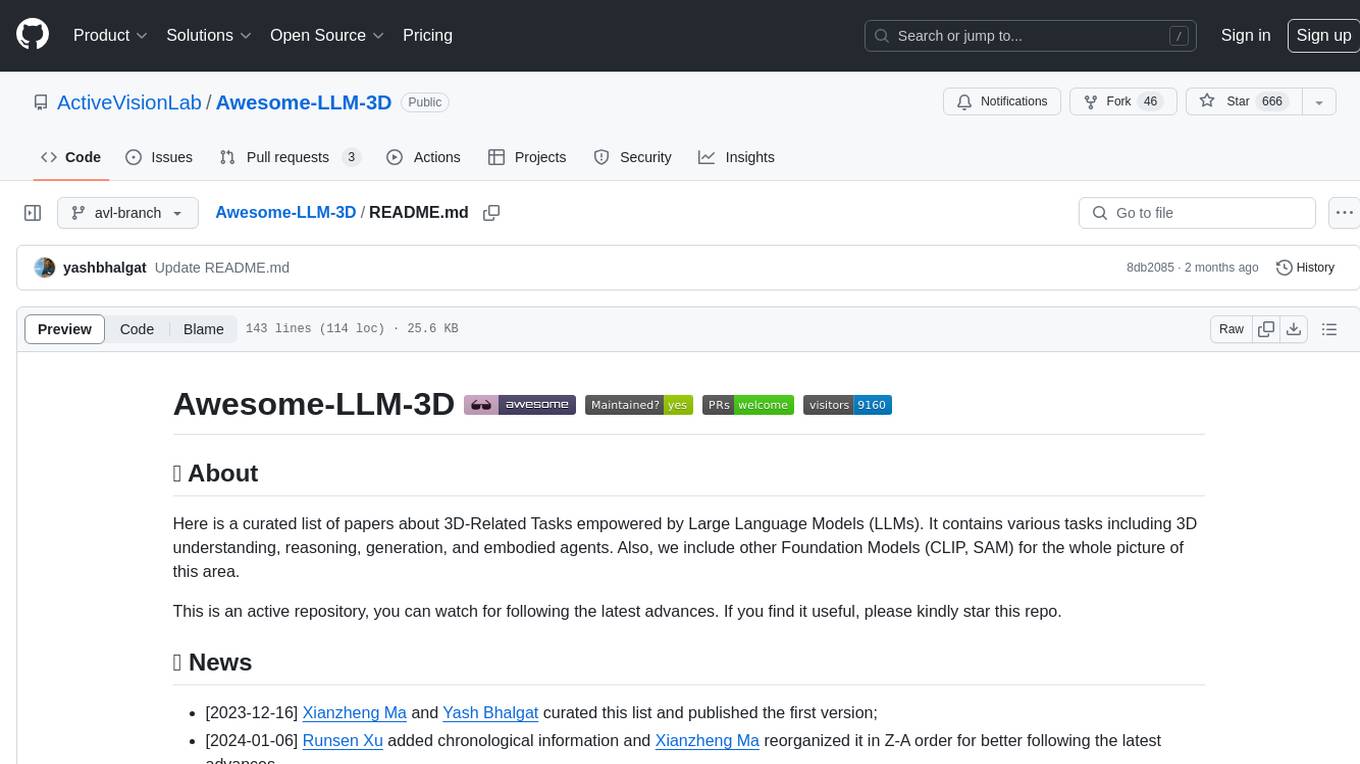
Awesome-LLM-3D
This repository is a curated list of papers related to 3D tasks empowered by Large Language Models (LLMs). It covers tasks such as 3D understanding, reasoning, generation, and embodied agents. The repository also includes other Foundation Models like CLIP and SAM to provide a comprehensive view of the area. It is actively maintained and updated to showcase the latest advances in the field. Users can find a variety of research papers and projects related to 3D tasks and LLMs in this repository.
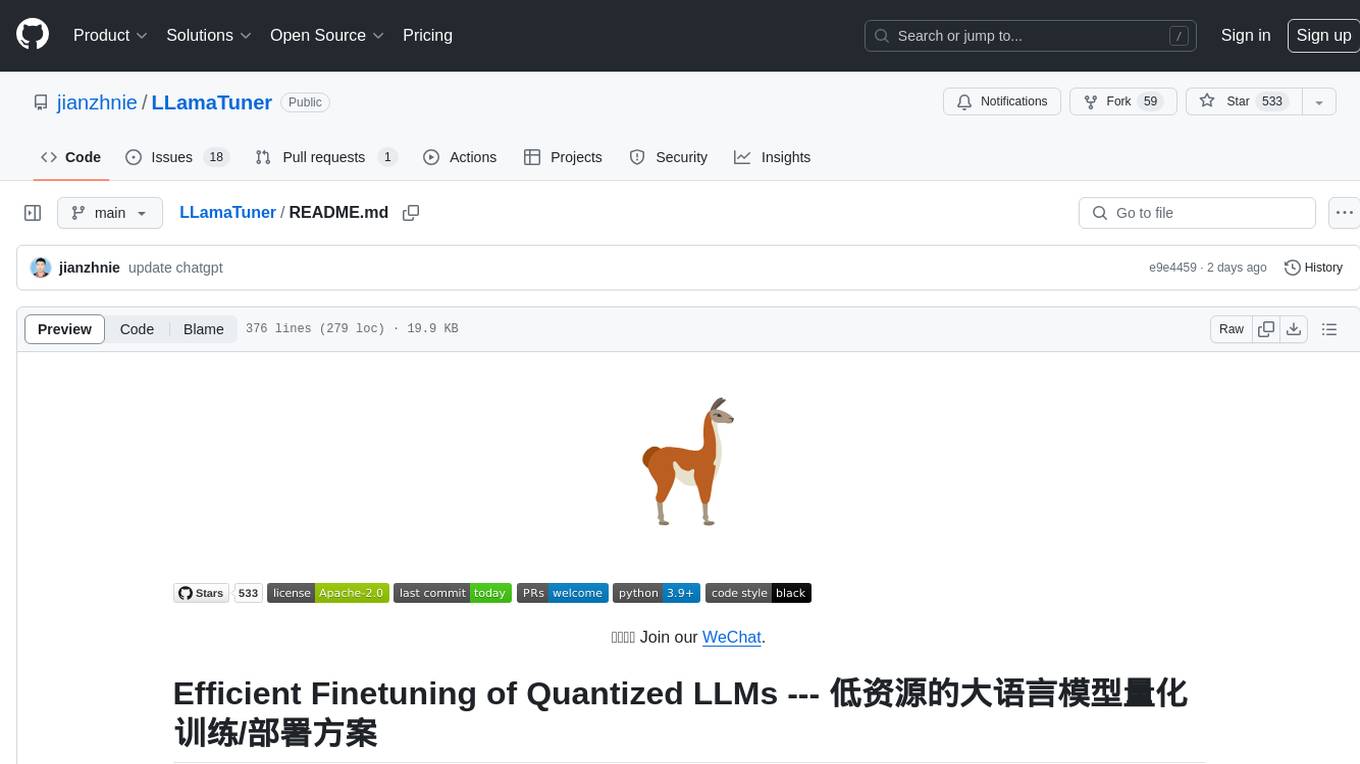
LLamaTuner
LLamaTuner is a repository for the Efficient Finetuning of Quantized LLMs project, focusing on building and sharing instruction-following Chinese baichuan-7b/LLaMA/Pythia/GLM model tuning methods. The project enables training on a single Nvidia RTX-2080TI and RTX-3090 for multi-round chatbot training. It utilizes bitsandbytes for quantization and is integrated with Huggingface's PEFT and transformers libraries. The repository supports various models, training approaches, and datasets for supervised fine-tuning, LoRA, QLoRA, and more. It also provides tools for data preprocessing and offers models in the Hugging Face model hub for inference and finetuning. The project is licensed under Apache 2.0 and acknowledges contributions from various open-source contributors.
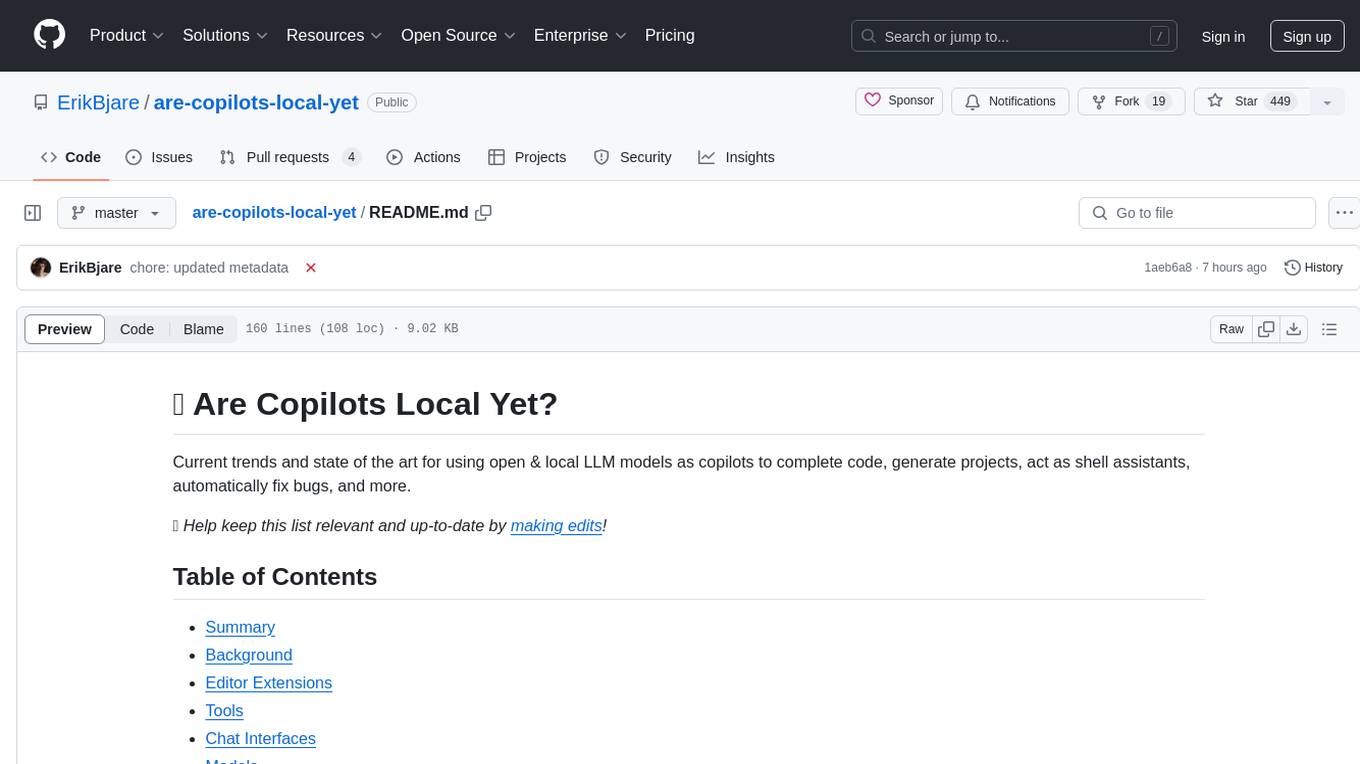
are-copilots-local-yet
Current trends and state of the art for using open & local LLM models as copilots to complete code, generate projects, act as shell assistants, automatically fix bugs, and more. This document is a curated list of local Copilots, shell assistants, and related projects, intended to be a resource for those interested in a survey of the existing tools and to help developers discover the state of the art for projects like these.
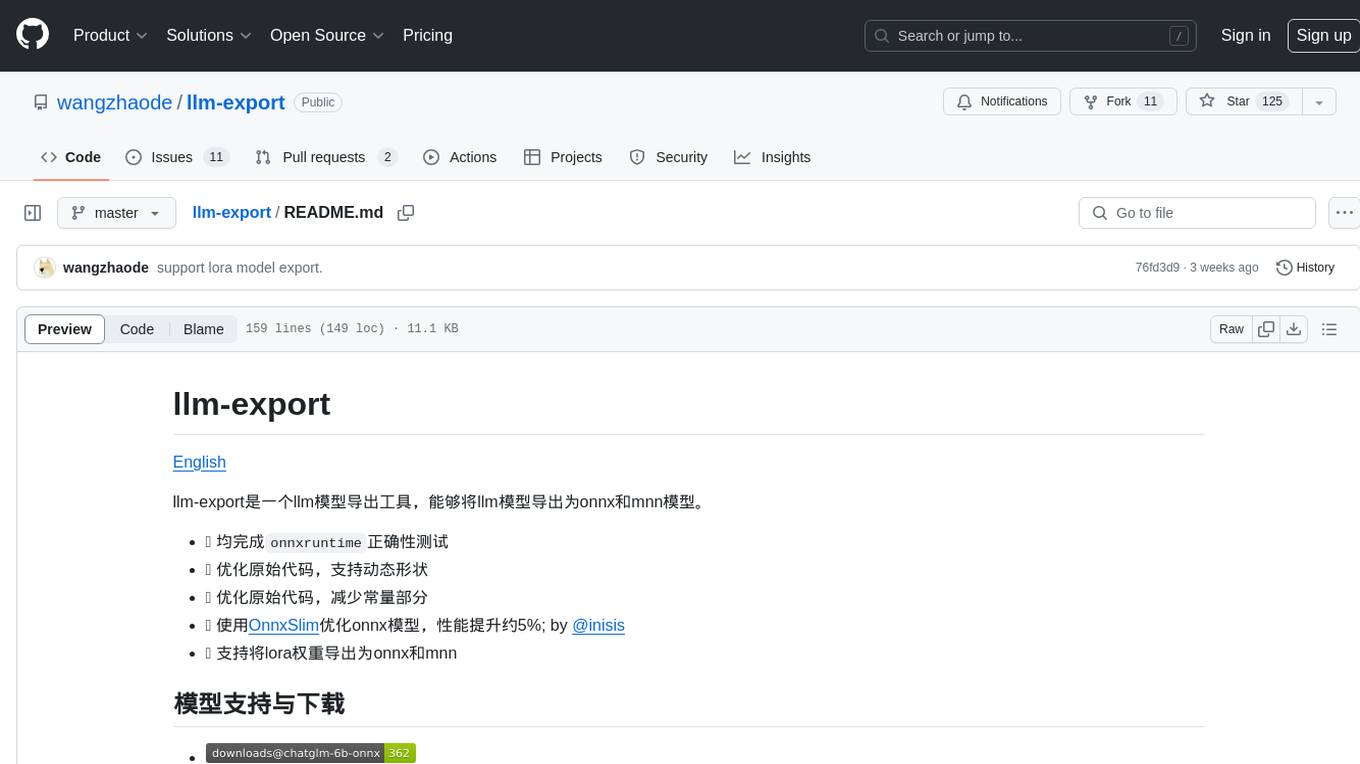
llm-export
llm-export is a tool for exporting llm models to onnx and mnn formats. It has features such as passing onnxruntime correctness tests, optimizing the original code to support dynamic shapes, reducing constant parts, optimizing onnx models using OnnxSlim for performance improvement, and exporting lora weights to onnx and mnn formats. Users can clone the project locally, clone the desired LLM project locally, and use LLMExporter to export the model. The tool supports various export options like exporting the entire model as one onnx model, exporting model segments as multiple models, exporting model vocabulary to a text file, exporting specific model layers like Embedding and lm_head, testing the model with queries, validating onnx model consistency with onnxruntime, converting onnx models to mnn models, and more. Users can specify export paths, skip optimization steps, and merge lora weights before exporting.
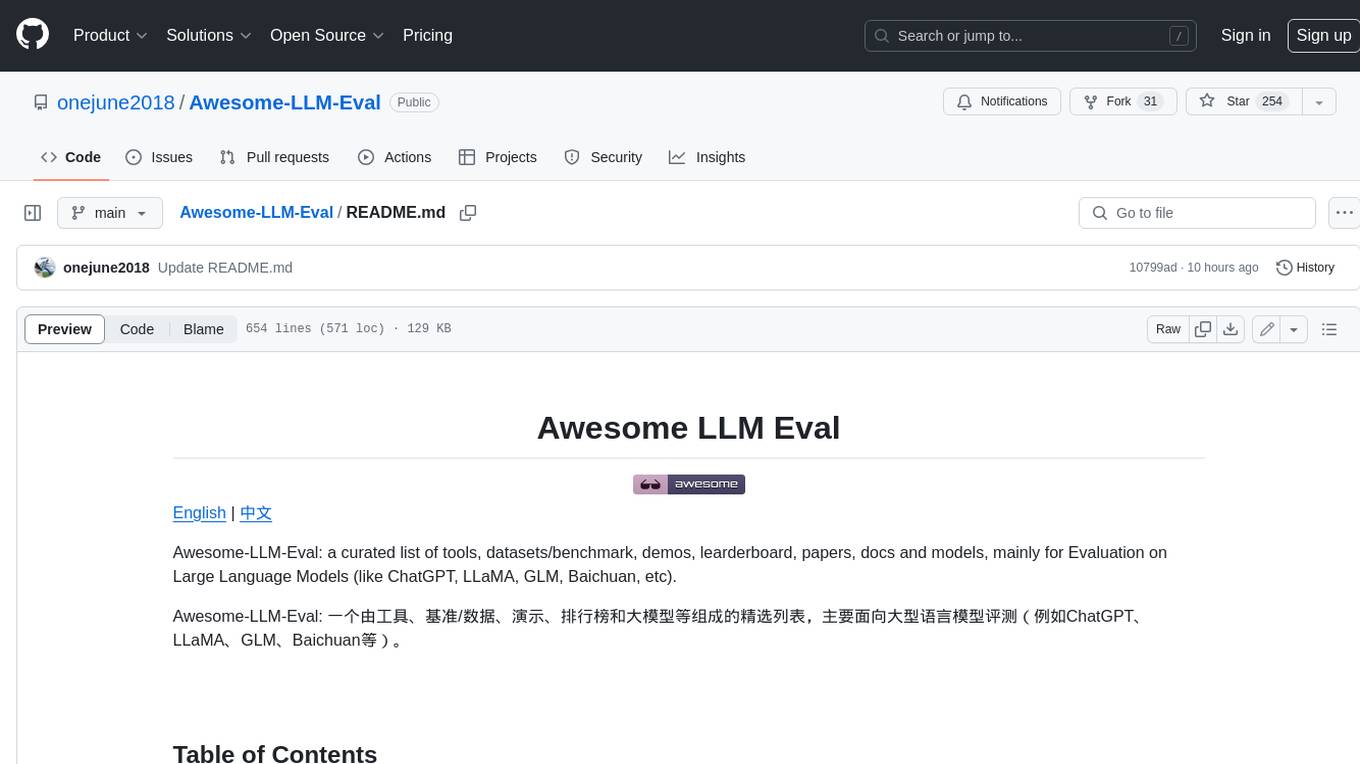
Awesome-LLM-Eval
Awesome-LLM-Eval: a curated list of tools, benchmarks, demos, papers for Large Language Models (like ChatGPT, LLaMA, GLM, Baichuan, etc) Evaluation on Language capabilities, Knowledge, Reasoning, Fairness and Safety.
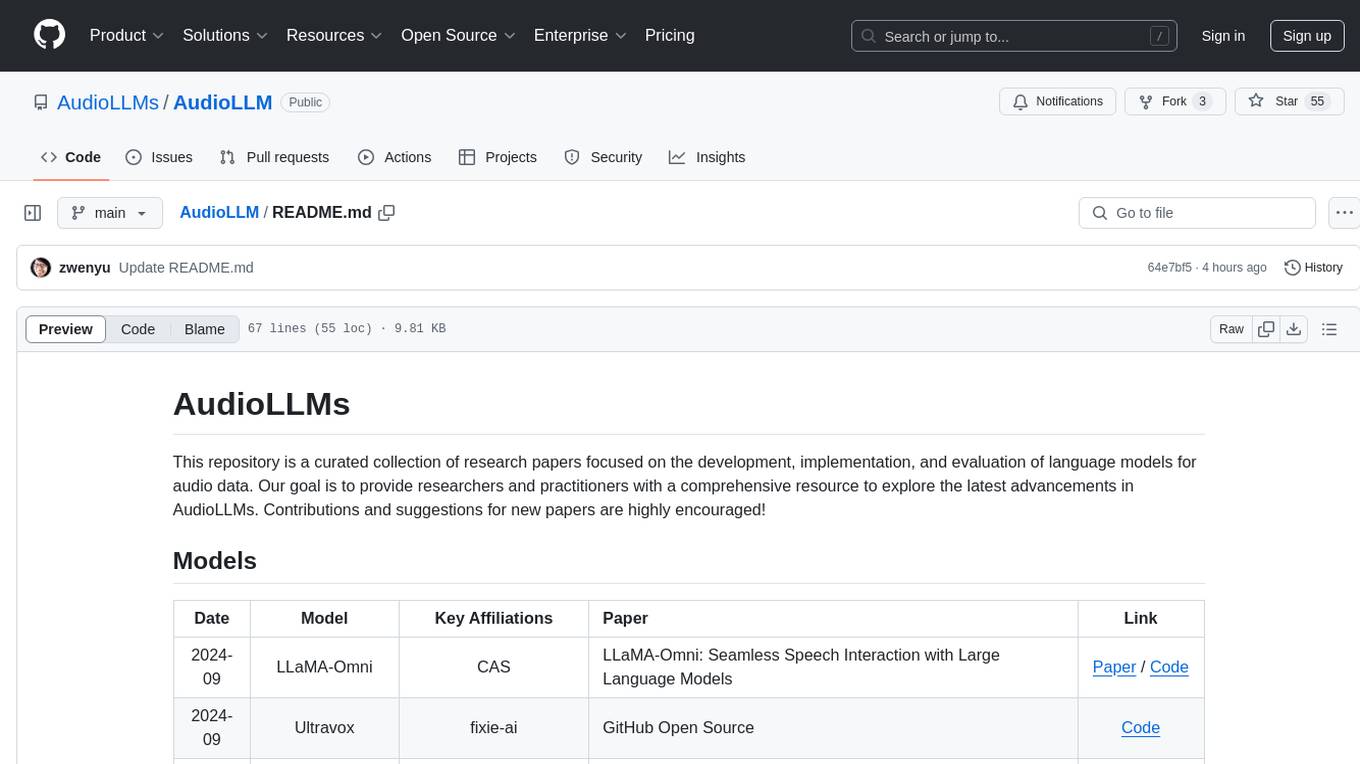
AudioLLM
AudioLLMs is a curated collection of research papers focusing on developing, implementing, and evaluating language models for audio data. The repository aims to provide researchers and practitioners with a comprehensive resource to explore the latest advancements in AudioLLMs. It includes models for speech interaction, speech recognition, speech translation, audio generation, and more. Additionally, it covers methodologies like multitask audioLLMs and segment-level Q-Former, as well as evaluation benchmarks like AudioBench and AIR-Bench. Adversarial attacks such as VoiceJailbreak are also discussed.
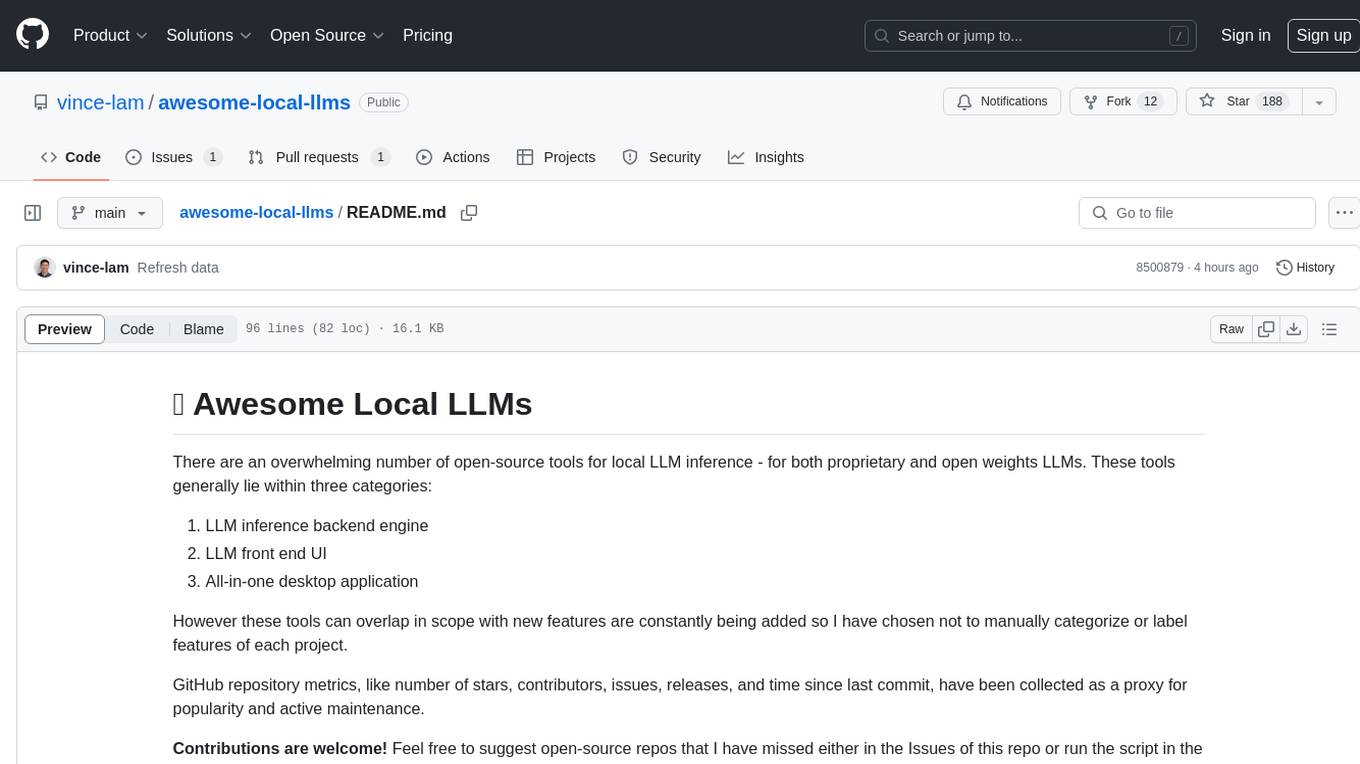
awesome-local-llms
The 'awesome-local-llms' repository is a curated list of open-source tools for local Large Language Model (LLM) inference, covering both proprietary and open weights LLMs. The repository categorizes these tools into LLM inference backend engines, LLM front end UIs, and all-in-one desktop applications. It collects GitHub repository metrics as proxies for popularity and active maintenance. Contributions are encouraged, and users can suggest additional open-source repositories through the Issues section or by running a provided script to update the README and make a pull request. The repository aims to provide a comprehensive resource for exploring and utilizing local LLM tools.
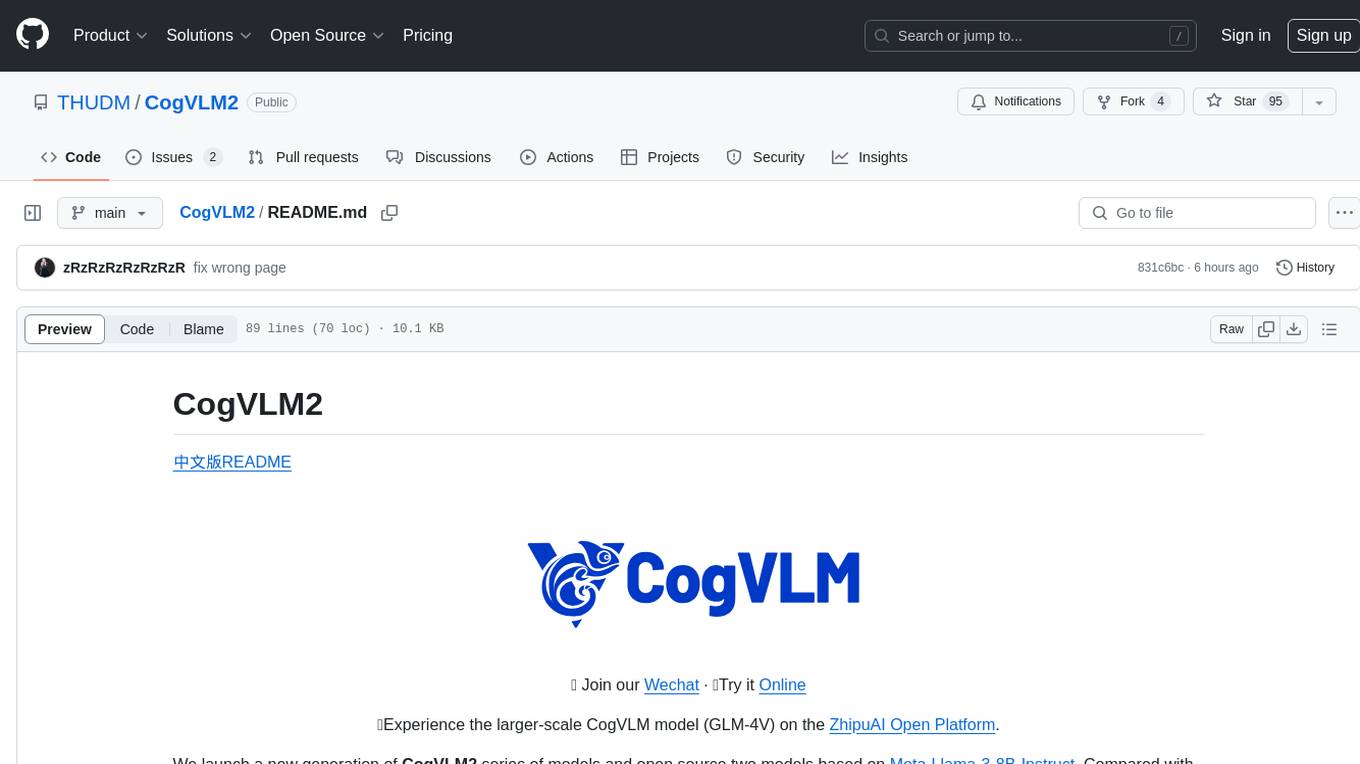
CogVLM2
CogVLM2 is a new generation of open source models that offer significant improvements in benchmarks such as TextVQA and DocVQA. It supports 8K content length, image resolution up to 1344 * 1344, and both Chinese and English languages. The project provides basic calling methods, fine-tuning examples, and OpenAI API format calling examples to help developers quickly get started with the model.
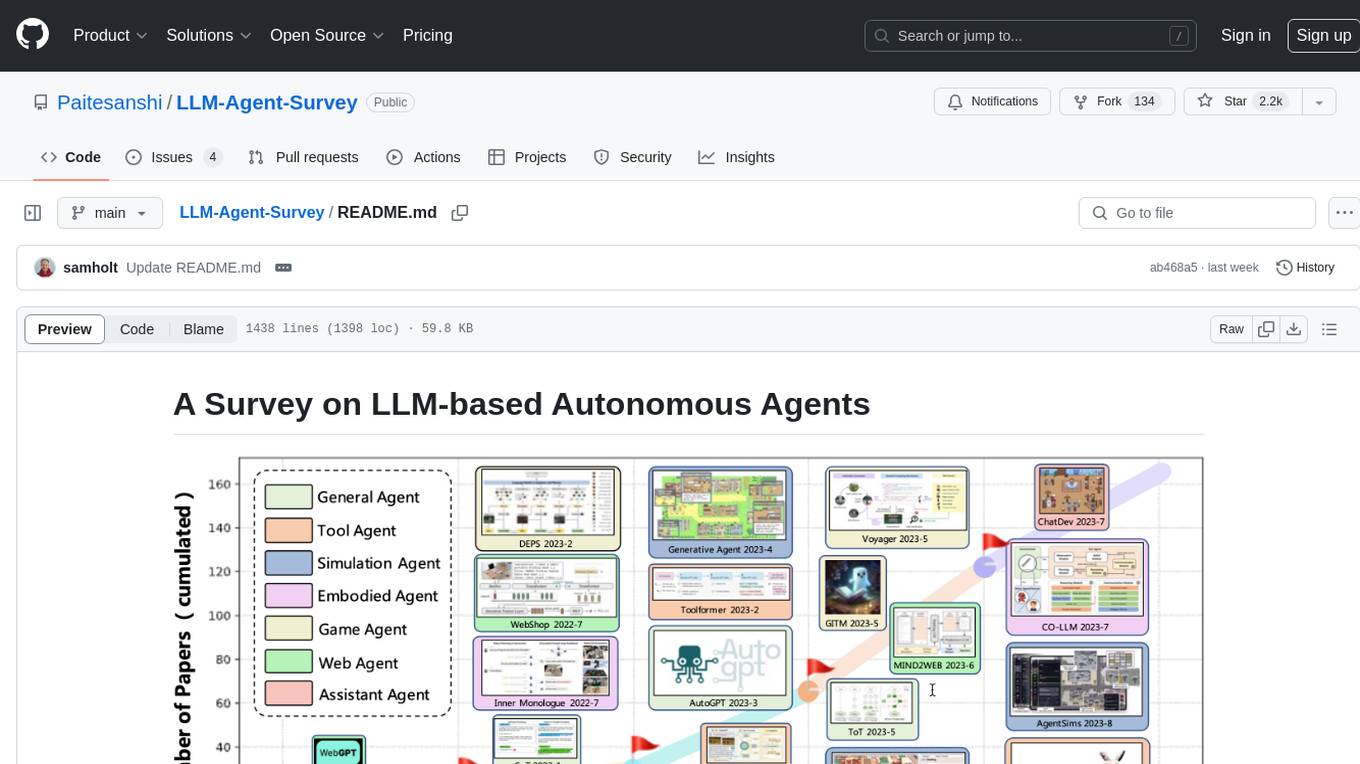
LLM-Agent-Survey
Autonomous agents are designed to achieve specific objectives through self-guided instructions. With the emergence and growth of large language models (LLMs), there is a growing trend in utilizing LLMs as fundamental controllers for these autonomous agents. This repository conducts a comprehensive survey study on the construction, application, and evaluation of LLM-based autonomous agents. It explores essential components of AI agents, application domains in natural sciences, social sciences, and engineering, and evaluation strategies. The survey aims to be a resource for researchers and practitioners in this rapidly evolving field.
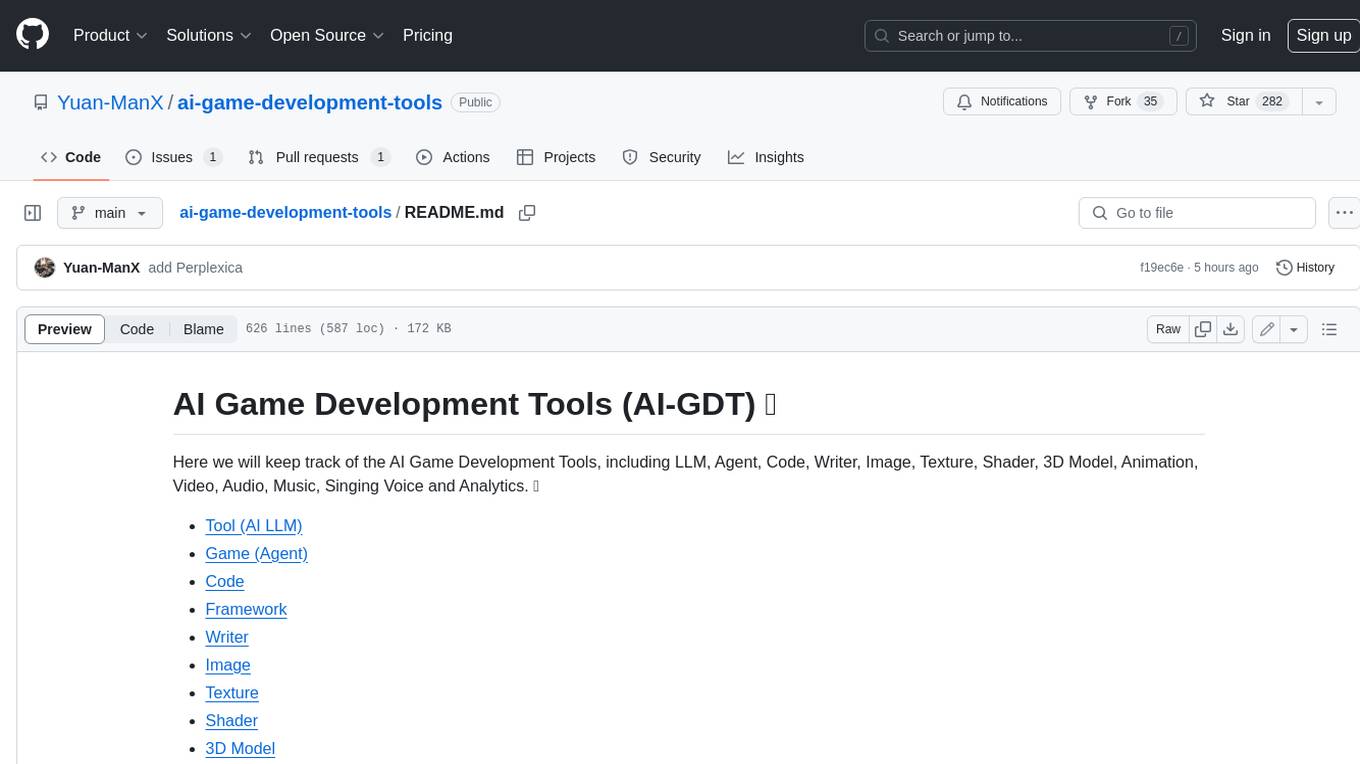
ai-game-development-tools
Here we will keep track of the AI Game Development Tools, including LLM, Agent, Code, Writer, Image, Texture, Shader, 3D Model, Animation, Video, Audio, Music, Singing Voice and Analytics. 🔥 * Tool (AI LLM) * Game (Agent) * Code * Framework * Writer * Image * Texture * Shader * 3D Model * Avatar * Animation * Video * Audio * Music * Singing Voice * Speech * Analytics * Video Tool
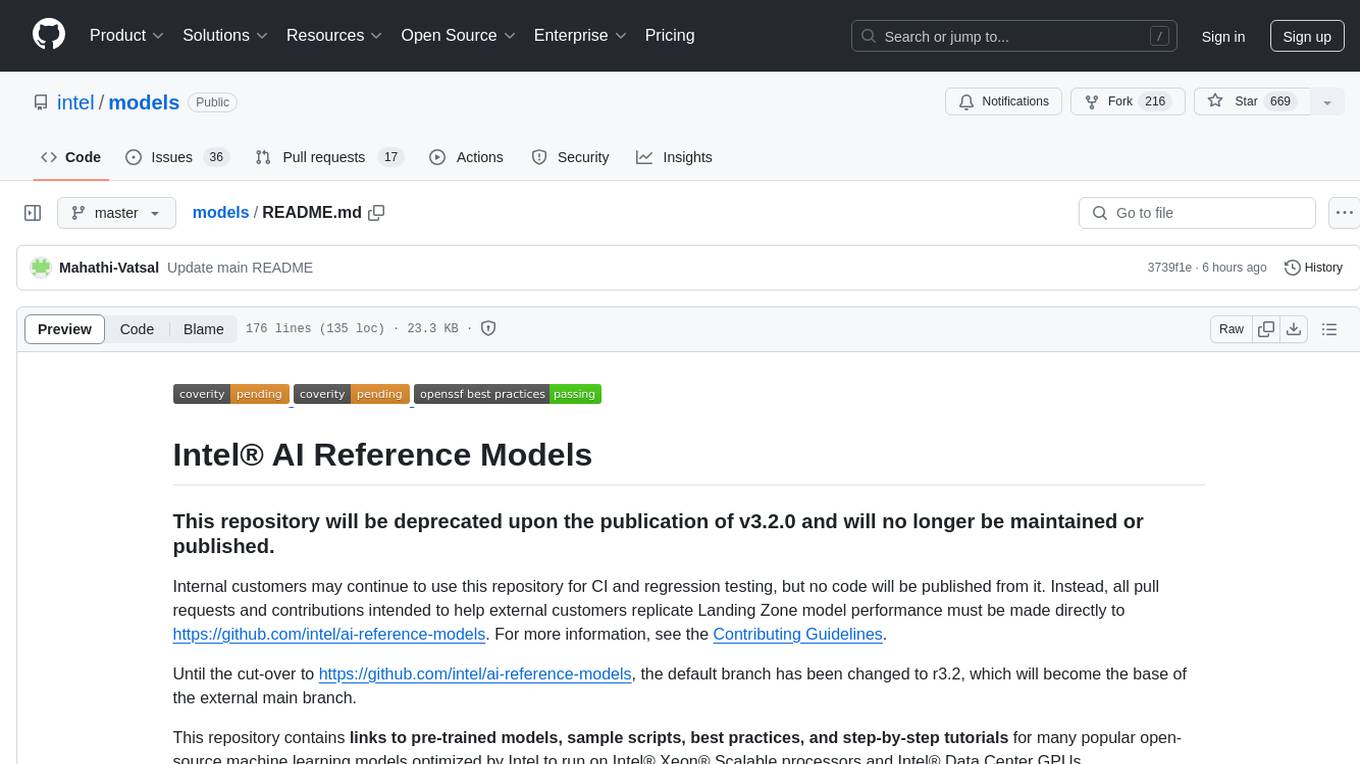
models
The Intel® AI Reference Models repository contains links to pre-trained models, sample scripts, best practices, and tutorials for popular open-source machine learning models optimized by Intel to run on Intel® Xeon® Scalable processors and Intel® Data Center GPUs. It aims to replicate the best-known performance of target model/dataset combinations in optimally-configured hardware environments. The repository will be deprecated upon the publication of v3.2.0 and will no longer be maintained or published.
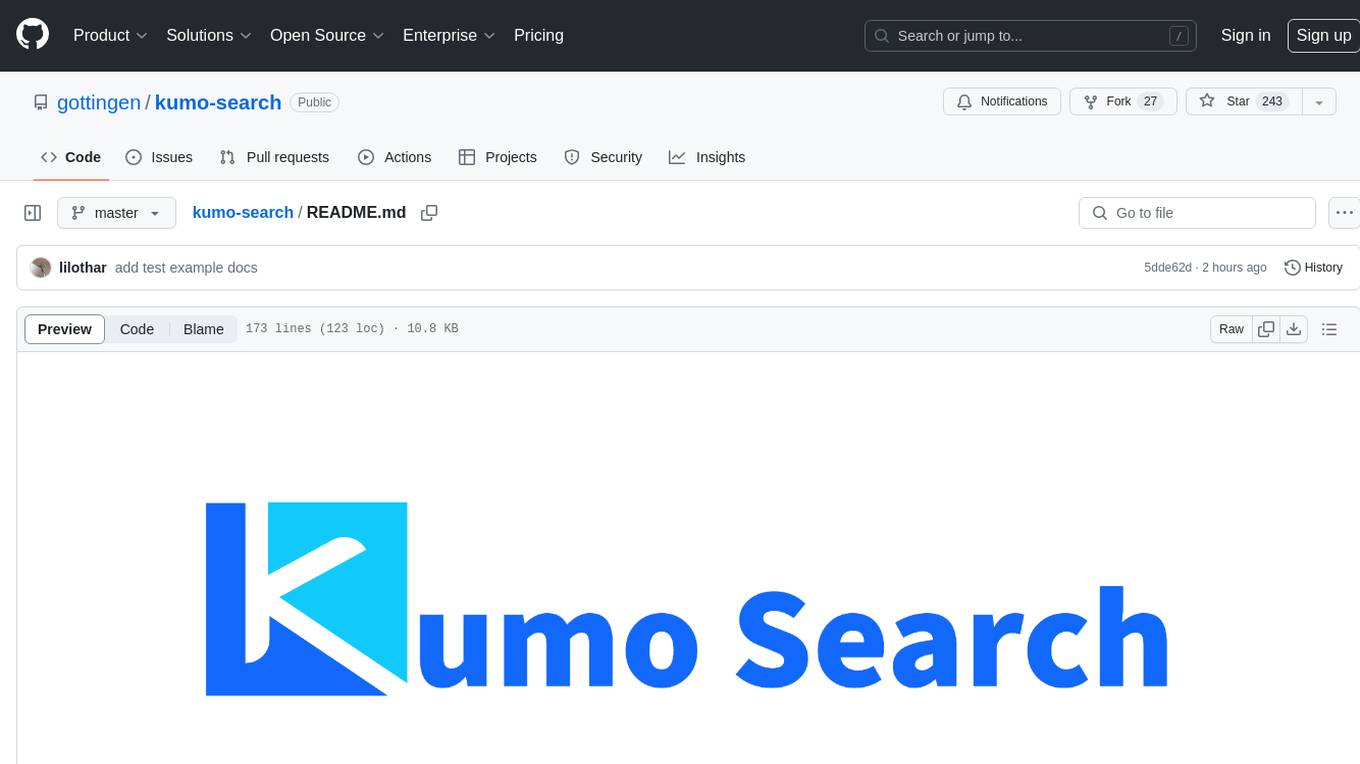
kumo-search
Kumo search is an end-to-end search engine framework that supports full-text search, inverted index, forward index, sorting, caching, hierarchical indexing, intervention system, feature collection, offline computation, storage system, and more. It runs on the EA (Elastic automic infrastructure architecture) platform, enabling engineering automation, service governance, real-time data, service degradation, and disaster recovery across multiple data centers and clusters. The framework aims to provide a ready-to-use search engine framework to help users quickly build their own search engines. Users can write business logic in Python using the AOT compiler in the project, which generates C++ code and binary dynamic libraries for rapid iteration of the search engine.
For similar tasks

open-llms
Open LLMs is a repository containing various Large Language Models licensed for commercial use. It includes models like T5, GPT-NeoX, UL2, Bloom, Cerebras-GPT, Pythia, Dolly, and more. These models are designed for tasks such as transfer learning, language understanding, chatbot development, code generation, and more. The repository provides information on release dates, checkpoints, papers/blogs, parameters, context length, and licenses for each model. Contributions to the repository are welcome, and it serves as a resource for exploring the capabilities of different language models.
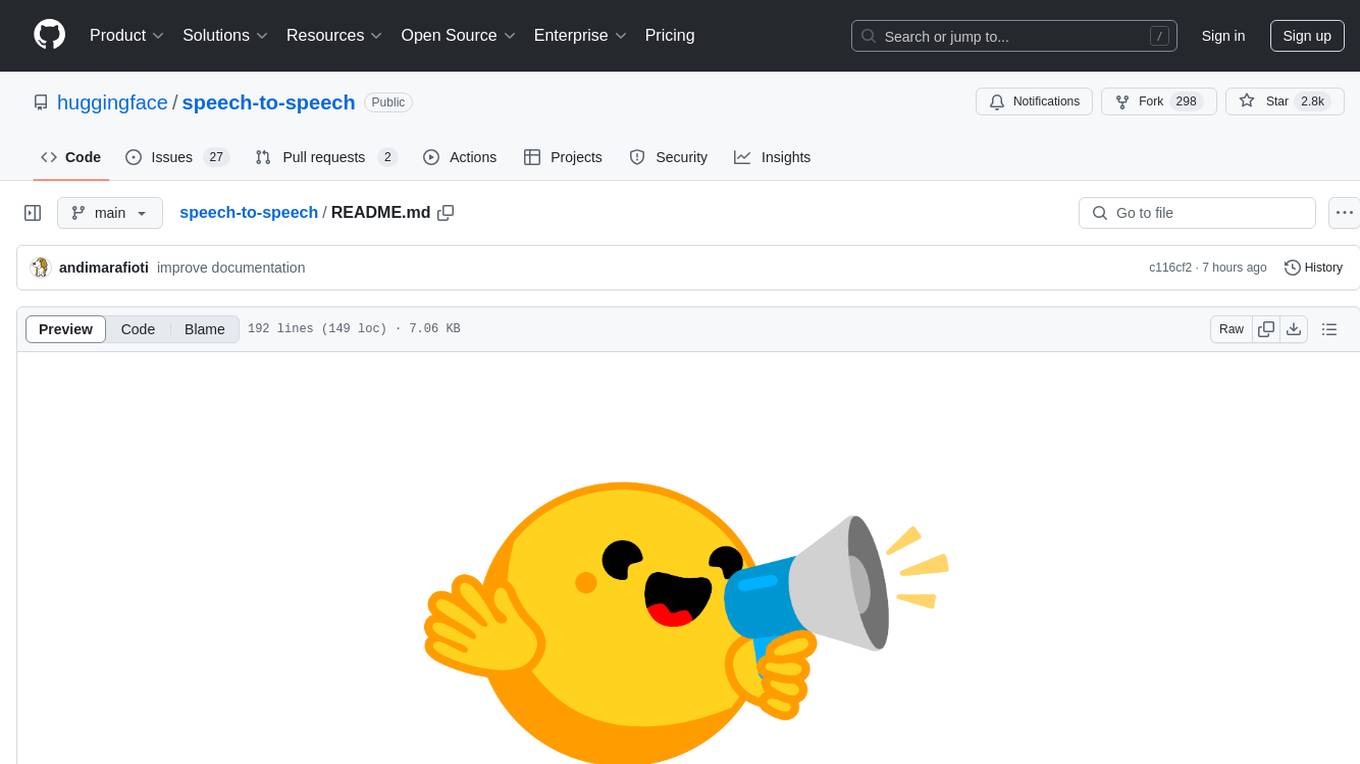
speech-to-speech
This repository implements a speech-to-speech cascaded pipeline with consecutive parts including Voice Activity Detection (VAD), Speech to Text (STT), Language Model (LM), and Text to Speech (TTS). It aims to provide a fully open and modular approach by leveraging models available on the Transformers library via the Hugging Face hub. The code is designed for easy modification, with each component implemented as a class. Users can run the pipeline either on a server/client approach or locally, with detailed setup and usage instructions provided in the readme.
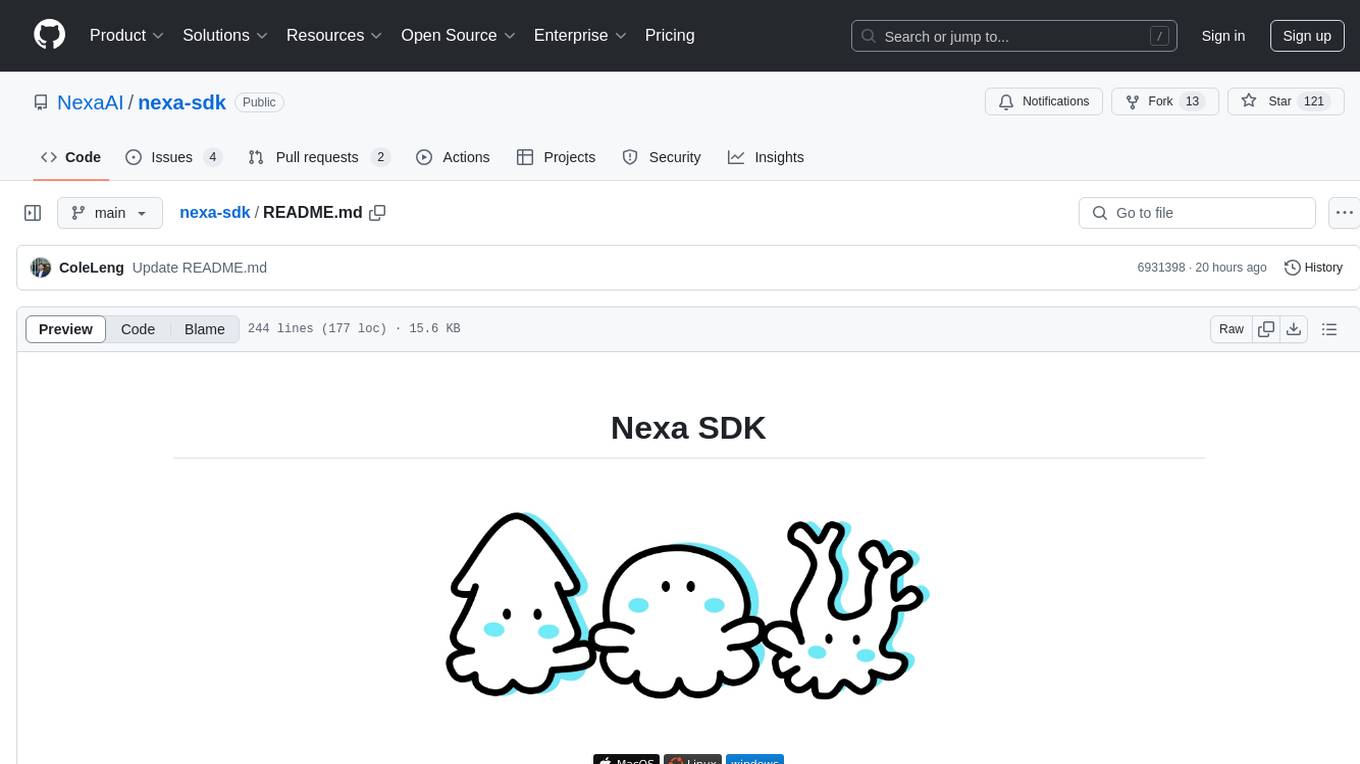
nexa-sdk
Nexa SDK is a comprehensive toolkit supporting ONNX and GGML models for text generation, image generation, vision-language models (VLM), and text-to-speech (TTS) capabilities. It offers an OpenAI-compatible API server with JSON schema mode and streaming support, along with a user-friendly Streamlit UI. Users can run Nexa SDK on any device with Python environment, with GPU acceleration supported. The toolkit provides model support, conversion engine, inference engine for various tasks, and differentiating features from other tools.
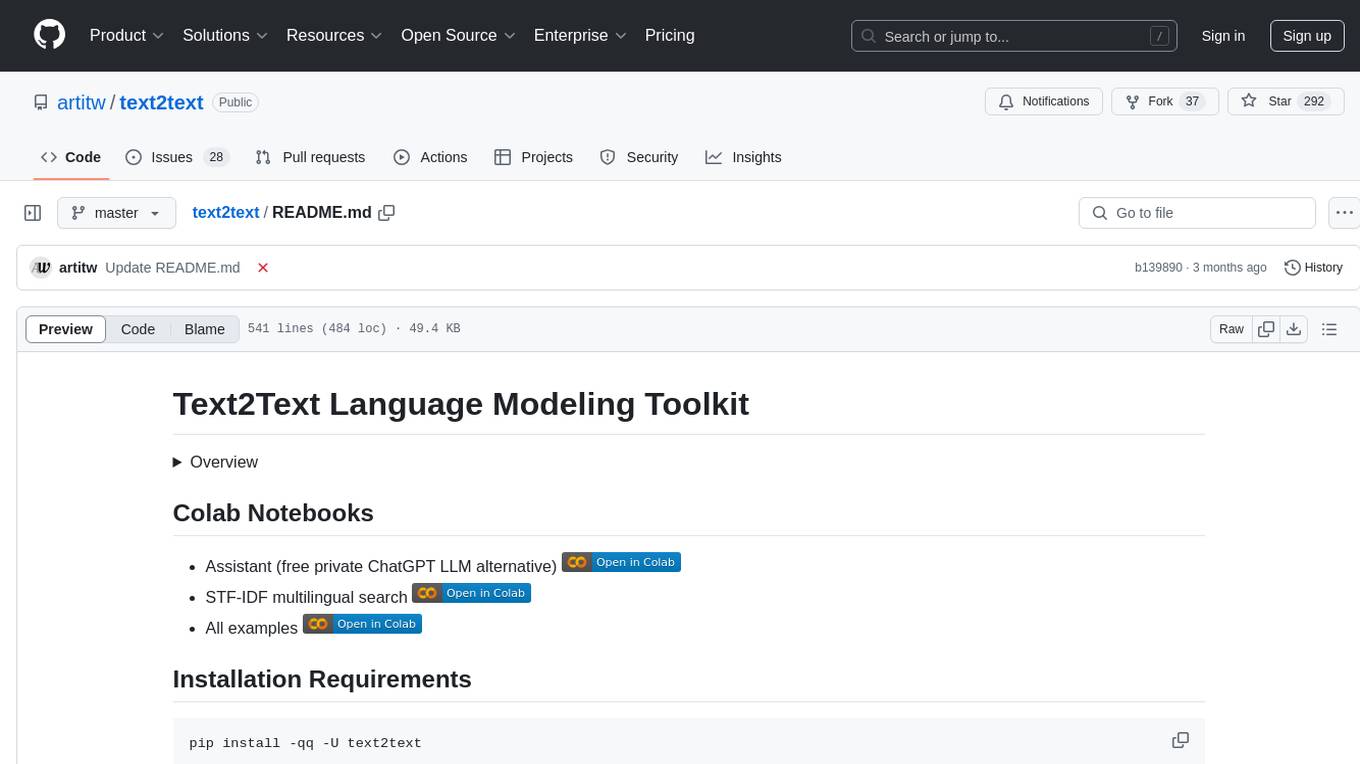
text2text
Text2Text is a comprehensive language modeling toolkit that offers a wide range of functionalities for text processing and generation. It provides tools for tokenization, embedding, TF-IDF calculations, BM25 scoring, indexing, translation, data augmentation, distance measurement, training/finetuning models, language identification, and serving models via a web server. The toolkit is designed to be user-friendly and efficient, offering a variety of features for natural language processing tasks.

agentcloud
AgentCloud is an open-source platform that enables companies to build and deploy private LLM chat apps, empowering teams to securely interact with their data. It comprises three main components: Agent Backend, Webapp, and Vector Proxy. To run this project locally, clone the repository, install Docker, and start the services. The project is licensed under the GNU Affero General Public License, version 3 only. Contributions and feedback are welcome from the community.

zep-python
Zep is an open-source platform for building and deploying large language model (LLM) applications. It provides a suite of tools and services that make it easy to integrate LLMs into your applications, including chat history memory, embedding, vector search, and data enrichment. Zep is designed to be scalable, reliable, and easy to use, making it a great choice for developers who want to build LLM-powered applications quickly and easily.

lollms
LoLLMs Server is a text generation server based on large language models. It provides a Flask-based API for generating text using various pre-trained language models. This server is designed to be easy to install and use, allowing developers to integrate powerful text generation capabilities into their applications.
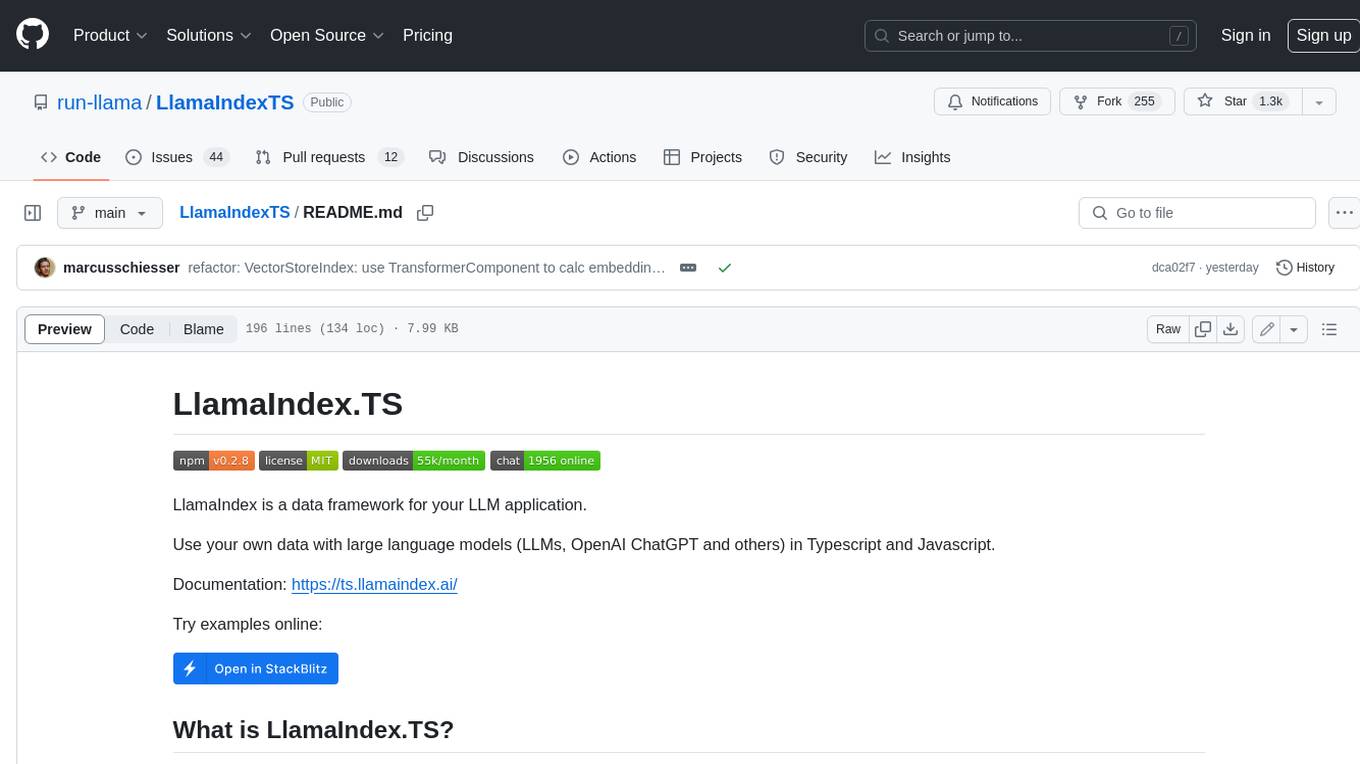
LlamaIndexTS
LlamaIndex.TS is a data framework for your LLM application. Use your own data with large language models (LLMs, OpenAI ChatGPT and others) in Typescript and Javascript.
For similar jobs

weave
Weave is a toolkit for developing Generative AI applications, built by Weights & Biases. With Weave, you can log and debug language model inputs, outputs, and traces; build rigorous, apples-to-apples evaluations for language model use cases; and organize all the information generated across the LLM workflow, from experimentation to evaluations to production. Weave aims to bring rigor, best-practices, and composability to the inherently experimental process of developing Generative AI software, without introducing cognitive overhead.

LLMStack
LLMStack is a no-code platform for building generative AI agents, workflows, and chatbots. It allows users to connect their own data, internal tools, and GPT-powered models without any coding experience. LLMStack can be deployed to the cloud or on-premise and can be accessed via HTTP API or triggered from Slack or Discord.

VisionCraft
The VisionCraft API is a free API for using over 100 different AI models. From images to sound.

kaito
Kaito is an operator that automates the AI/ML inference model deployment in a Kubernetes cluster. It manages large model files using container images, avoids tuning deployment parameters to fit GPU hardware by providing preset configurations, auto-provisions GPU nodes based on model requirements, and hosts large model images in the public Microsoft Container Registry (MCR) if the license allows. Using Kaito, the workflow of onboarding large AI inference models in Kubernetes is largely simplified.

PyRIT
PyRIT is an open access automation framework designed to empower security professionals and ML engineers to red team foundation models and their applications. It automates AI Red Teaming tasks to allow operators to focus on more complicated and time-consuming tasks and can also identify security harms such as misuse (e.g., malware generation, jailbreaking), and privacy harms (e.g., identity theft). The goal is to allow researchers to have a baseline of how well their model and entire inference pipeline is doing against different harm categories and to be able to compare that baseline to future iterations of their model. This allows them to have empirical data on how well their model is doing today, and detect any degradation of performance based on future improvements.

tabby
Tabby is a self-hosted AI coding assistant, offering an open-source and on-premises alternative to GitHub Copilot. It boasts several key features: * Self-contained, with no need for a DBMS or cloud service. * OpenAPI interface, easy to integrate with existing infrastructure (e.g Cloud IDE). * Supports consumer-grade GPUs.

spear
SPEAR (Simulator for Photorealistic Embodied AI Research) is a powerful tool for training embodied agents. It features 300 unique virtual indoor environments with 2,566 unique rooms and 17,234 unique objects that can be manipulated individually. Each environment is designed by a professional artist and features detailed geometry, photorealistic materials, and a unique floor plan and object layout. SPEAR is implemented as Unreal Engine assets and provides an OpenAI Gym interface for interacting with the environments via Python.

Magick
Magick is a groundbreaking visual AIDE (Artificial Intelligence Development Environment) for no-code data pipelines and multimodal agents. Magick can connect to other services and comes with nodes and templates well-suited for intelligent agents, chatbots, complex reasoning systems and realistic characters.
